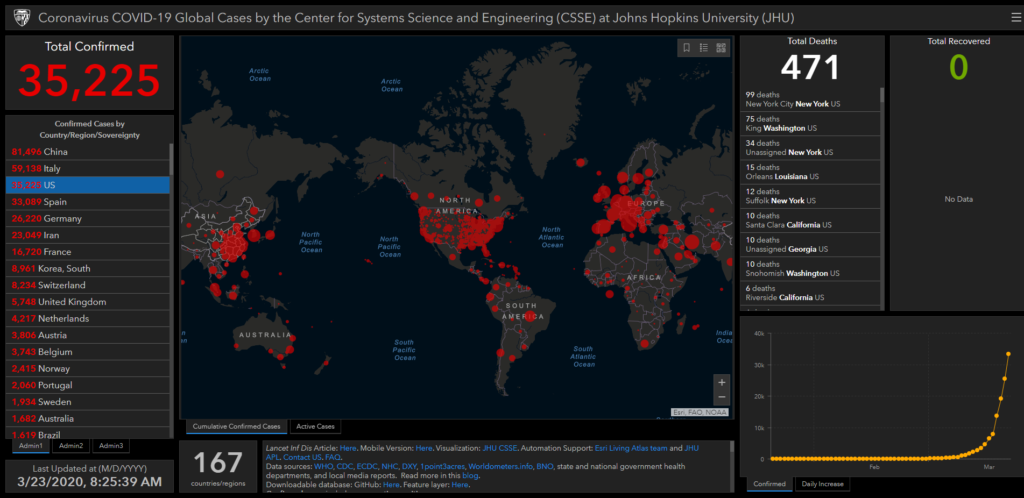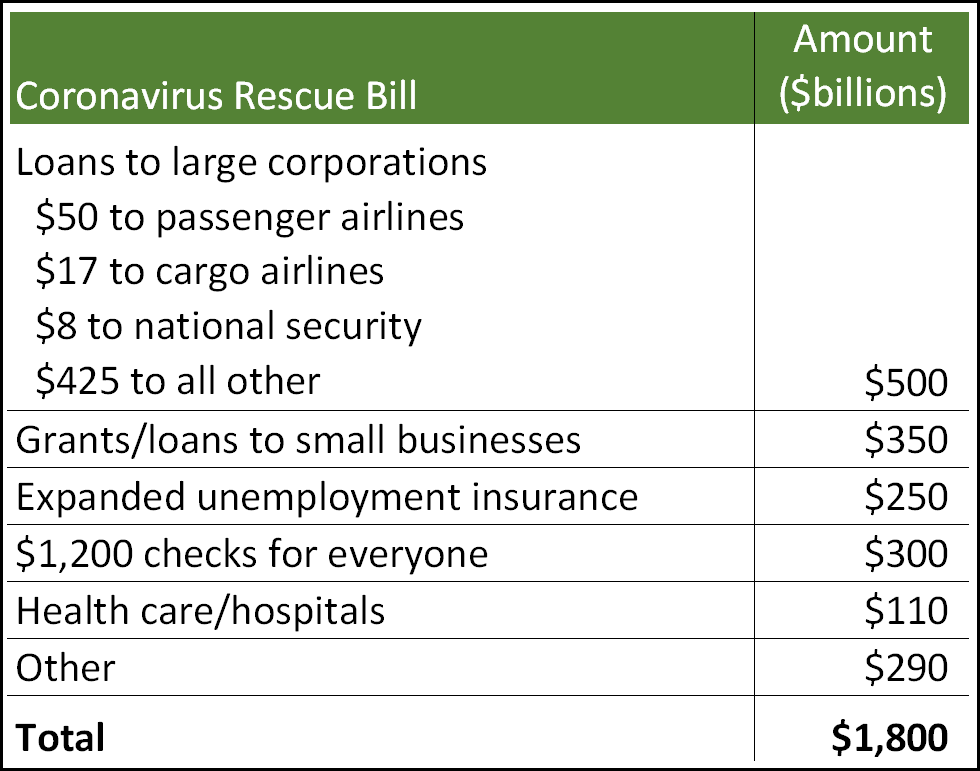World as of 8:25 am:

US as of 8:25 am:

Sadly, the numbers now suggest the U.S. is poised to take the lead in #coronavirus cases. It’s reasonable to plan for the US to top the list of countries with the most cases in approximately 1 week. This does NOT make social intervention futile. It makes it imperative!
— Thomas P. Bossert (@TomBossert) March 23, 2020
Locally:

County numbers, according to county health departments:
- Alamance County has three positive coronavirus cases
- Davie County has one positive coronavirus case
- Davidson County has two positive coronavirus cases
- Forsyth County has 12 positive coronavirus cases
- Two are identified as community-spread
- Guilford County has 11 positive coronavirus cases
- Montgomery County has one positive coronavirus case
- Randolph County has one positive coronavirus case
Stay safe out there! “Hands… washing hands..” 🎶 pic.twitter.com/QaRB1qZshp
— Neil Diamond (@NeilDiamond) March 22, 2020
Trump announced that he is activating the National Guard in California, New York and Washington state in an effort to combat the coronavirus outbreak during a briefing at the White House Sunday evening.
A vote to advance the massive coronavirus stimulus bill failed last night in the Senate as negotiations had yet to produce a deal on the more than $1 trillion aid package. A second vote has now been scheduled for Monday shortly after 12:00 p.m. ET.
Republicans, who needed 60 votes to move forward on the bill, weren’t able to win over any Democrats to proceed, meaning no aid will flow to the economy — including checks to individuals, help for small businesses and bailouts for big corporations — until an agreement is reached.
Democrats said that they were dissatisfied with worker protections in the bill, which was written by Republicans, and that the rules on corporate bailouts are too lax.
It is remarkably difficult to get precise details about the coronavirus rescue bill that’s currently stalled in the Senate. But here are the main pieces:

The negotiations over this bill have been almost a parody of modern American political polarization. Republicans cared only about the loans to businesses and the flashy $1,200 checks for all Americans. Democrats insisted on unemployment insurance replacing 100 percent of income; money for hospitals; and making the $1,200 checks equal for everyone.
Republicans mostly caved in on the Democratic demands, but their price was an increase from $200 billion to $500 billion in the loans for big corporations. You might wonder why there was a price for this. Why did Republicans have to be talked into it in the first place? There was some muttering about not trusting the states to disburse the money or something, but in the end it was just because they’re Republicans. Putting corporations first is in their DNA or something.
Oh, and the $500 billion loan pool would be under the control of the Secretary of the Treasury and would have virtually no strings attached. It’s just a giant slush fund that the Trump administration can do anything with. Does anyone think for a second that Trump wouldn’t use this as leverage to help his friends and punish his enemies? Of course he would.
This was the straw that broke the camel’s back.
UPDATE — still no bill today:
49-46, Senate again fails to advance the coronavirus package. Democrats block it, like yesterday, complaining that the Senate Republican bill is not good enough yet. Negotiations are continuing.
— Sahil Kapur (@sahilkapur) March 23, 2020
In other news, Trump is reportedly growing irritated that Dr. Anthony Fauci, director of the National Institute of Allergy and Infectious Diseases, keeps publicly correcting his misstatements about the coronavirus pandemic.
Sources tell the New York Times that “Trump has become frustrated with Dr. Fauci’s blunt approach at the briefing lectern, which often contradicts things the president has just said.”
The president has given Fauci more leeway to contradict him than he has with most other officials, however, because he “knows that Dr. Fauci is seen as credible with a large swath of the public and with journalists.”
The Times also reports that Trump’s frustration with Fauci is part of a broader frustration with medical experts in the White House who have pushed for social distancing as a way to contain the disease.
“There has been a growing sentiment that medical experts were allowed to set policy that has hurt the economy, and there has been a push to find ways to let people start returning to work,” the Times reports. “Some Republican lawmakers have also pleaded with the White House to find ways to restart the economy, as financial markets continue to slide and job losses for April could be in the millions.”
WaPo has a story confirming something that has long been implicit (based on Trump’s treatment, for a period, of COVID-19 briefings as classified). The intelligence community was tracking and briefing on the COVID-19 outbreak long before it rose to public attention.
U.S. intelligence agencies were issuing ominous, classified warnings in January and February about the global danger posed by the coronavirus while President Trump and lawmakers played down the threat and failed to take action that might have slowed the spread of the pathogen, according to U.S. officials familiar with spy agency reporting.
***
Intelligence agencies “have been warning on this since January,” said a U.S. official who had access to intelligence reporting that was disseminated to members of Congress and their staffs as well as to officials in the Trump administration, and who, along with others, spoke on the condition of anonymity to describe sensitive information.
***
The warnings from U.S. intelligence agencies increased in volume toward the end of January and into early February, said officials familiar with the reports. By then, a majority of the intelligence reporting included in daily briefing papers and digests from the Office of the Director of National Intelligence and the CIA was about covid-19, said officials who have read the reports.
The money line repeats one the CIA used to describe how George Bush ignored warnings about 9/11: the system was blinking red.
“Donald Trump may not have been expecting this, but a lot of other people in the government were — they just couldn’t get him to do anything about it,” this official said. “The system was blinking red.”
What’s key though (and, because of editing decisions, doesn’t get a lot of focus in the story) is one reason why Trump didn’t heed the warnings of his briefers: because he believed Xi Jingpeng more than he believed the US intelligence community.
The intelligence reports didn’t predict when the virus might land on U.S. shores or recommend particular steps that public health officials should take, issues outside the purview of the intelligence agencies. But they did track the spread of the virus in China, and later in other countries, and warned that Chinese officials appeared to be minimizing the severity of the outbreak.
***
Robert Kadlec, the assistant secretary for preparedness and response — who was joined by intelligence officials, including from the CIA — told committee members that the virus posed a “serious” threat, one of those officials said.
Kadlec didn’t provide specific recommendations, but he said that to get ahead of the virus and blunt its effects, Americans would need to take actions that could disrupt their daily lives, the official said. “It was very alarming.”
Trump’s insistence on the contrary seemed to rest in his relationship with China’s President Xi Jingping, whom Trump believed was providing him with reliable information about how the virus was spreading in China, despite reports from intelligence agencies that Chinese officials were not being candid about the true scale of the crisis.
We all pay for Robert Kadlec to make sure policymakers get warnings about such things. And yet, Trump refused to believe those warnings because someone he trusted more — Xi — told him differently.
Trump has been permitted to believe his authoritarian buddies over the intelligence community on all manner of things. It derives from two things: first, his own innate fondness for authoritarians. But also, his need to believe Vladimir Putin’s assurances that Russia didn’t help him get elected.
The enabling of Trump’s fondness for dictators will end up being very costly for the United States.

Trump’s tweeting today suggests that he doesn’t understand how viruses work:
THIS IS WHY WE NEED BORDERS!
— Donald J. Trump (@realDonaldTrump) March 23, 2020
And he seems to be anxious about the social distancing and isolation:
WE CANNOT LET THE CURE BE WORSE THAN THE PROBLEM ITSELF. AT THE END OF THE 15 DAY PERIOD, WE WILL MAKE A DECISION AS TO WHICH WAY WE WANT TO GO!
— Donald J. Trump (@realDonaldTrump) March 23, 2020
Biden says he’ll do his first “presentation” from his new home TV studio (built in what had been a rec room, he says) today around 11:30 a.m. ET.
As for isolation and self-distancing:
Everyone is coping in their own way.
Some of us need humor, from the dumb and punny to the satirical and dark.
Some of us need all the news and updates and details possible.
Some of us need to limit what we take into our brains.
Some of us need the distraction of normalcy. Just because we’re not posting about the news doesn’t mean we’re ignoring it.
Some of us need to leave the house every day and breathe the air and move our bodies. You may even find us standing in the rain.
Some of us are frozen with fear in our homes.
Some of us can work from home.
Some of us still drive to work every day and spend that day sanitizing everything instead of working as much as usual.
Some of us wish that working from home were an option, so we’d still have income.
Some of us go into creative mode, trying new crafts and finishing old ones and tackling those long-planned home improvement projects.
Some of us sit and read or or watch TV or play on our phones for hours.
Some of us are introverts, but we still need human interaction.
Some of us are extroverts, and the energy depletion from lack of socializing is real.
Some of us are clinging to our online friendships like a lifeline.
Some of us are clinging inward to our own family units.
Everyone copes in their own way. We’re just not used to coping en masse
Economy continues to tank. It is at 18,926 as of 10:05 am, down about 244 for the day, most likely on the belief that the unemployment levels will show an unemployment rate something close to what it was during the Great Depression.
